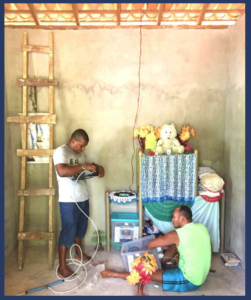In the scope of its 2022 thematic campaign on sustainable construction in Latin America, the setec Foundation is supporting a project to install sustainable energy infrastructure to empower an Amazonian community in Brazil.
The association
The Peabiru Institute’s mission is to foster the protagonism of social groups in the Amazon, to promote full access to their fundamental rights. For 23 years, it has been working towards this goal by managing dozens of initiatives in the Brazilian Amazon region in conjunction with numerous associative, private and research partners.
For this project, the Peabiru Institute is accompanied by a technical partner, IDEAAS (Instituto para Desenvolvimento de Energias Alternativas e da Auto Sustentabilidade) and a research partner, the Federal University of Para.
The context
The Quilombola of Africa and Laranjituba territory, where the project takes place, is located in the Eastern Amazon, in the Grand Belem region of Brazil. This region of Brazil, characterized by the rurality of many families (over 20,000), faces a high rate of illiteracy, as well as reduced access to drinking water, means of communication, health services and electricity. Indeed, Brazilian public services are not, to date, able to provide permanent and sustainable services in these rural areas, for populations often isolated from urban networks.
In this context of precariousness in basic services, the communities of the territory of Quilombola of Africa and Laranjituba are even more excluded as they are descendants of the populations of Black slaves settled on this territory since 1717, and are victims of discriminations, in particular on the employment market. As the Brazilian State has not established any inclusive public policy in their favor, the Peabiru Institute has proposed a project for energy autonomy and water security for the 93 families of the community to compensate for this lack of economic opportunity.
The project
Objectives
The objective of the “Quilombo Solar” project is to improve the quality of life of the territory of Quilombola of Africa and Laranjituba through greater energy autonomy and water security. The energy autonomy of the community will be put to the benefit of the productive activity of products derived from cassava and acai, allowing the establishment of an income generating activity for the population.
Activities
The activities of the project consist firstly in the application of the participative methodology that defines it for the realization of a diagnosis of the demand by the members of the community themselves.
Then it will consist of the elaboration of a plan for the energy autonomy and the water security, realized with the partnerships of the project, the Federal University of Parà and IDEAAS, which will propose a sustainable system of water and energy supply, in stages.
According to this autonomy plan, the different materials will be acquired by the Peabiru Institute for the community and assembled with the beneficiaries. The last step will be the installation of the community water and energy systems.
- The community water supply and treatment system will be composed of a unit of solar water pumping and filtering systems (10,000 liters/day each)
- The energy system will be composed of ten units of solar home systems (SSHS equipment developed by the partner IDEAAS adapted to the local conditions of extreme heat and humidity) for lighting, communication, and a lamp to keep bats away. This equipment will be installed in the planned community spaces (common use spaces, school, flour house, craft shed, public baths).
- The production support system, for the raw material processing activities, will be composed of a solar-powered freezing unit with batteries for the storage of açai and fruit, and a solar-powered açai pulper unit without batteries.

@Peabiru Institute
Sustainable construction
The setec Foundation is supporting the Quilombo Solar project as part of the sustainable empowerment of the Quitasol community. This project contributes to the three targets of Sustainable Development Goal (SDG) 7: ensure universal access to energy services (7.1), increase the share of renewable energy in the energy mix (7.2) and improve energy efficiency (7.3).
The installation of solar-powered infrastructure allows for the sustainability of the new activities that will result from this project, and thus new sources of income for the community.
